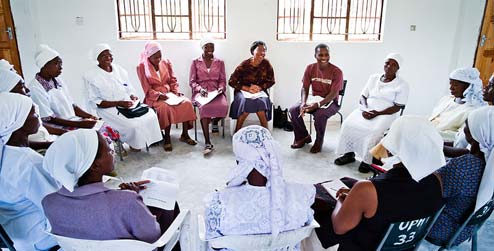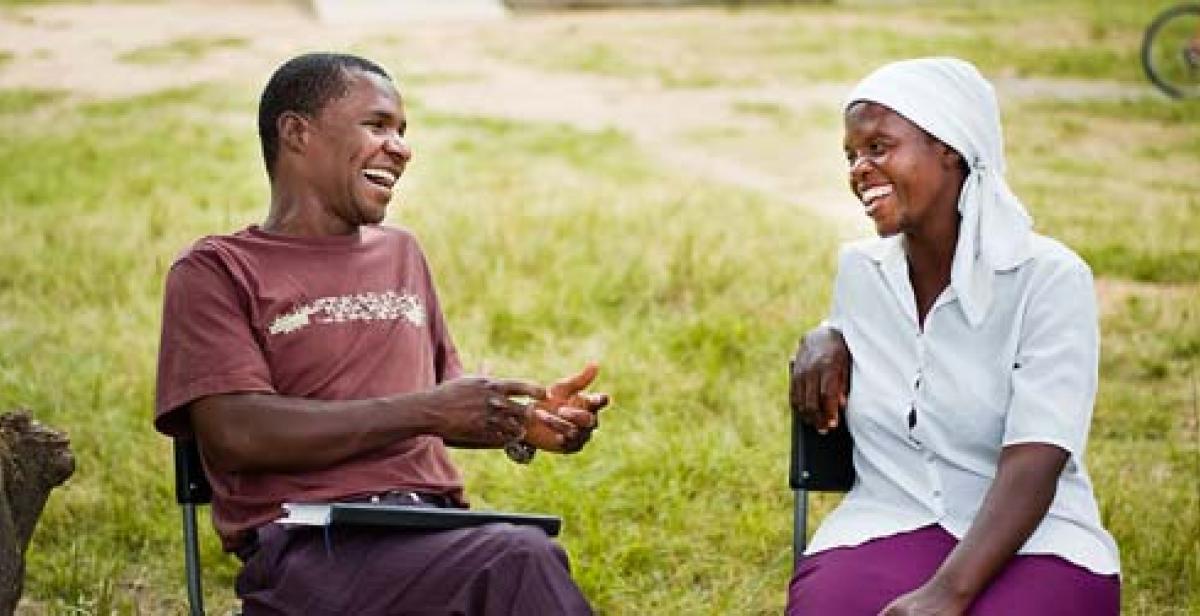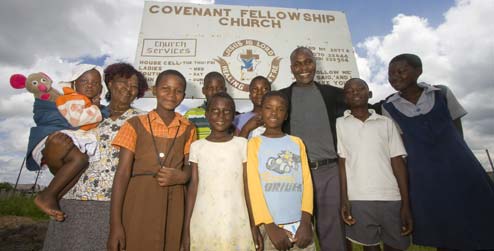Philemon, from Zimbabwe, recently worked as a Programme Development and Good Governance Adviser, alongside the Union for the Development of Apostolic and Zionist Churches in Zimbabwe - Africa (UDACIZA)
What is your work background?
I am a teacher by profession. Before joining Progressio, I worked as a high school teacher in Zimbabwe. Whilst teaching, I became a volunteer with the Women and AIDS Support Network, an organisation that promotes the rights of women and girls. I left teaching to work as a Programme Coordinator with Zimbabwe AIDS Network (ZAN), a national network of AIDS Service Organisations in Zimbabwe. I then left ZAN to undertake further studies in Development Studies in the UK, where I also worked as a part-time teacher for two years.
What inspired you to become a Development Worker with Progressio?
Progressio’s vision and mission to build the capacity of poor people so that they are empowered to transform their own lives was critical in inspiring me to become a Development Worker.
One of the other key factors that influenced me to join Progressio was the uniqueness of the Progressio model where Development Workers are deployed at partner organisations to build their capacity whilst based with them on a full-time basis. The Progressio model is effective in that you are able to build the capacity of the partner organisation through day-to-day interaction with the staff.
What is your first memory of the placement?
I came back to Zimbabwe from the UK when the country was at the peak of its economic and political crisis. My first memory is of coming into contact with poverty stricken communities and people who had experienced high levels of political polarisation. The biggest realisation was that people needed to be assisted to be able to be recognised as active participants in local governance and development initiatives in their communities, and in the country at large.
What do you enjoy most about your role?
The opportunity to impart my skills, knowledge and experiences to the partner organisation, and the opportunity to interact with members of the grassroots community, government ministries and colleagues from other development partners. This interaction has enabled me to influence decision makers in government, as well as help empower the poor to meaningfully participate in development issues that influence and affect their lives.
What has been the most exciting moment so far?
UDACIZA was formed in 1993 and up until 2013 the organisation had been operating without a Strategic Action Plan. This was negatively affecting the organisation in terms of resource mobilisation for programme implementation. On 17 December 2013, UDACIZA with assistance from Progressio and UNICEF launched its first three-year Strategic Action Plan (2014-16). The launch has helped to generate a lot of interest from development partners who want to work with and support UDACIZA.
Another exciting moment has been the impact of the Action For Better Governance project with the Catholic Commission for Justice and Peace - Zimbabwe (CCJPZ), where I was a Development Worker before joining UDACIZA. One of the CCJPZ Justice and Peace actors Catherine Mhondiwa ran for the July 2013 general election and was elected as a Ward Councillor in the midlands town of Gweru. Mrs Mhondiwa was an ordinary woman who was empowered to participate in local governance issues largely through empowerment training under the Action for Better Governance project.
And the biggest lesson?
The wheels of church-based organisations turn slowly and the Development Worker needs a lot of patience and diplomacy to achieve placement objectives.
It is also important for the Development Worker to be as transparent and objective as is possible. S/he has to be able to view things beyond the horizon.
What is the biggest change you have witnessed since starting your placement?
The biggest change within the partner organisation has been the change in their recruitment and selection processes. Previously the organisation did not have a formal recruitment and selection process. Officers were recruited more on the basis of allegiance to the Apostolic Churches than anything else. Now they are recruited on the basis of skills and experience for posts.
If you could change one thing, what would that be?
If I could have the power to remove harmful religious practices used to oppress women and girls, I would be very happy. Harmful religious practices such as the pledging of girls, polygamy and forced virginity testing, among others, are rife in some of the Apostolic Churches in Zimbabwe. Generally speaking, women and girls have no say in the home and church. Some churches seem to misinterpret the Bible and use it to abuse women and girls.
 Photo © Marcus Perkins/Progressio
Photo © Marcus Perkins/Progressio
What advice would you give to someone who is thinking of becoming a Development Worker?
If you enjoy sharing and getting new knowledge, skills and experiences in development targeted at assisting the poor to realise their full potential, you are highly recommended to be part of the Progressio Development Worker team. The Progressio model is unique and very effective in empowering poor people so that they are able to reach their full potential.
Where do you see yourself now that your placement has ended? And in what ways has this placement with Progressio going to assist you to get there?
It is my hope and aspiration that I will be able to get more involved in international development. My placement with Progressio helped to build my capacity to be a more effective and progressive development practitioner.




